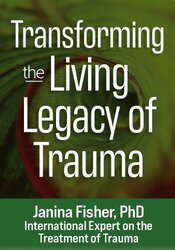

Despite having survived, trauma survivors are often left with a fragmented, confusing sense of what happened. Traumatic reminders continue to keep the trauma ‘alive’ by repetitively re-activating the stress response system and survival defences. Unaware that these reactions are traumatic memories held in the body, they assume that they are still in danger or somehow at fault.
They still feel unsafe, still re-experience the same emotions of shame, fear, anger and hopelessness over and over again. Telling the story of what happened sometimes brings relief but does not resolve the ‘living legacy’ of traumatic reactions that continue to torment the client day after day.
Learn how to help clients make sense of trauma-based symptoms (such as overwhelming emotions, intrusive images, numbing and disconnection), manage these overwhelming reactions, and change their relationship to the traumatic experiences, putting the past to rest.
| File type | File name | Number of pages | |
|---|---|---|---|
| Transforming the ‘Living Legacy’ of Trauma - Manual (1.8 MB) | 17 Pages | Available after Purchase |

Janina Fisher, PhD, is a licensed clinical psychologist and former instructor at The Trauma Center, a research and treatment center founded by Bessel van der Kolk. Known as an expert on the treatment of trauma, Dr. Fisher has also been treating individuals, couples, and families since 1980.
She is past president of the New England Society for the Treatment of Trauma and Dissociation, an EMDR International Association Credit Provider, Assistant Educational Director of the Sensorimotor Psychotherapy Institute, and a former Instructor, at Harvard Medical School. Dr. Fisher lectures and teaches nationally and internationally on topics related to the integration of the neurobiological research and newer trauma treatment paradigms into traditional therapeutic modalities.
She is co-author with Pat Ogden of Sensorimotor Psychotherapy: Interventions for Attachment and Trauma (2015) and author of Healing the Fragmented Selves of Trauma Survivors: Overcoming Internal Self-Alienation (2017) and the forthcoming book, Working with the Neurobiological Legacy of Trauma (in press).
Speaker Disclosures:
Please wait ...